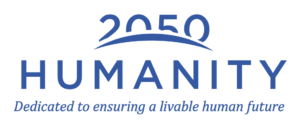Humanity 2050

I founded Humanity 2050 in the fall of 2017. This institute builds on my strategies of Thought++, which I developed over a decade of careful study and analysis, and ideas from my Caltech course on “The World in 2050.” I started to realize that these ideas could make a critical real-world difference. I thus felt impelled to take a more active role in helping to find fresh ways of addressing some of the central challenges of the modern age – risks to our ecosystems, risks to the stability of our financial and political systems, risks that will arise with the widespread introduction of new forms of artificial intelligence.
Preliminary explorations with our new modes of thought suggest that they have great power. Case studies – those explored in my blog, public lectures, my course at Caltech, and my manuscript in progress – all illustrate the power of creative thought that comes from employing these new strategies. They show how Thought++ (these new ways of orchestrating thought) can help stimulate fresh ideas about the best ways to help ensure a livable human future. But – obviously – the real leverage, the real prospect for change, will only come as Thought++ is applied more widely, as potential solutions to our current challenges get tested, extended, revised, and used on a global scale.
To this end, Humanity 2050 has launched its first, large-scale, real-world test of these new methods of thought. As one of our key projects over the next several years, we are exploring prospects and potential plans for climate engineering (proposals to reflect sunlight in order to cool the earth as global warming starts to spiral out of control).
Obviously, the preferred scenario will still involve some rapid curtailment of CO2 emissions that keeps warming under 2 °C and that obviates any need for consideration of climate engineering. But attempts to curtail the rate of climate change have not yet succeeded. We thus may be faced with a dangerous kind of “devil’s choice” in a few years – being asked to choose between climate engineering and risks of runaway climate change.
This will be one of the most consequential decisions ever faced by humanity, and yet no coherent operational plan has been proposed, and there has been no balanced analysis of the potential risks and benefits. We thus think it’s prudent to start weighing the options – mapping and analyzing all the factors involved in this complex problem; integrating ideas from all over the planet; and developing a plan of action (with a list of associated risks) that society can weigh when it’s time to decide. We believe that our new algorithm for thought and our special focus teams can help us do this in a more systematic and thoughtful way.
Humanity 2050 is still in early stages of development. But I am thankful for a team with the vision and imagination and courage to help fight for the future, and work is proceeding rapidly. Please let us know if you may be able to help – at any stage and at any level. I’d be delighted to send a summary of our plans and would love to meet if you’re interested in getting more details (or have advice and suggestions about other strategies that could give added leverage to our efforts).
I hope we can work together and build a better future!